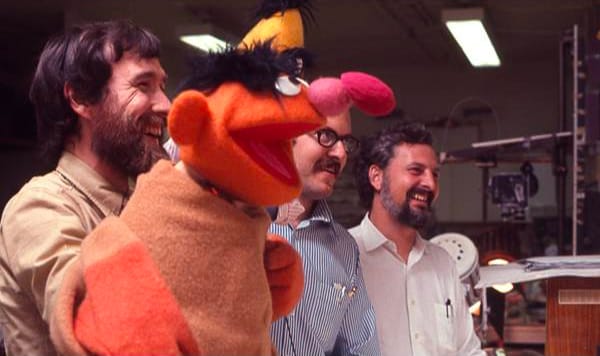Editor's note: This review was originally published at the 2021 Sundance Film Festival. Screen Media releases the film in theaters on Friday, April 23 with a VOD release to follow on Friday, May 7.
What's the magic formula that has made "Sesame Street" such an enduring hit? Midway through Marilyn Agrelo's loving and wide-ranging documentary "Street Gang," (human, not Muppet) star Roscoe Orman offers a succinct answer: "serious intent and joy." Initially conceived of as a then-revolutionary combination of children's entertainment and educational instruction --- literally inventing the idea of educational TV --- "Sesame Street" has only maintained and expanded its lofty ambitions over the course of more than five decades. That success, Agrelo's film sagely argues, was no accident, but instead the product of careful, considerate, and forward-thinking planning. It may be magic, but boy, does it take work.
While Agrelo's documentary, based on Michael Davis' similarly exhaustive nonfiction book of the same name, does occasionally nod to the price of that work, the film mostly tracks the story of what happens when a good idea is undertaken by good people. Many of those good people might not be readily familiar to fans of the show, not like Muppet geniuses Jim Henson, Frank Oz, and Caroll Spinney, or even human co-stars like Orman, Alan Muraoka, or Sonia Manzano. But "Street Gang" places them at the heart of its charm. Those names include Jon Stone, the show's ostensible creator and longtime director, and the visionary producer Joan Cooney.
Driven by a wealth of archival footage, including early looks at the Muppets' late night appearances (a scream) to classic bits with beloved characters, Agrelo takes a mostly chronological approach to the material. Still, with so much ground to cover and so many indelible people to explore, she often splinters off into segments dedicated to particular standouts, from the evolution of Big Bird (with Frank Biondo, the show's longtime camera operator and incredibly New York-y New Yorker blithely talking about the Muppet's "ugly" early years) to the craftsmanship behind a seminal episode, like the one in which the gang deals with the death of Mr. Hooper. At every turn, it seems, that eye for detail, emotion, and just plain care has been the force behind the enduring show.
That's because "Sesame Street" was, from the earliest of inklings, built on one thing: a love for its audience. That the concept first dreamed up by Cooney has endured for so long is perhaps the best indicator of just how brilliant it was (and still is). In the late '60s, the idea of educational television was totally foreign to most people, from families to academics, but Cooney dreamed of using the power of TV (and its hold on kids) for good. She wanted to reach all kinds of kids, but especially inner-city kids who had fallen behind at school. (Anyone who might rankle at the show's bent toward equality and social justice, somehow casting it as recent "woke-ism," will do well to learn how it was baked into every inch of the show, both then and now. It is what it is, and it's wonderful.)
Bolstered by findings that a show angled toward teaching its youngest viewers and armed with a generous federal funds package, Cooney set to work. What, she wondered, would this even look like? She recruited scads of talent, including the soft-hearted and wildly talented Stone, before the team eventually landed on something wild: Muppets! While "Sesame Street" is a cultural staple now --- as "Street Gang" shows, it was basically an *instant *cultural staple --- that it's hard to imagine it existing in any other form, the film takes pains to impress upon its audience just how artfully designed it was from the first, even if that often meant taking enormous risks.
One of those risks did, however, place the show into the crosshairs of the sort of small-minded people who still insist on beating back ideas rooted in equality, understanding, and honesty --- "Sesame Street" in a nutshell --- because they simply can't handle them. The docs takes on a fascinating twist as Agrelo examines an early boycott by the Mississippi Authority for Educational Television, which voted to take the show off the air, presumably because the all-white panel balked at the multiculturalism the show was rooted in. While Agrelo doesn't get too aggressive with her telling, she doesn't need to: footage from the time shows all sorts of Mississippi school kids vocalizing their support of the show, enough to inspire another station to capitalize on its massive popularity.
And while "Sesame Street" has always sought to present a wide-ranging look at the world, not all of its attempts panned out. "Street Gang," while often prone to presenting sunny takes on tough elements of the "Sesame Street" story, does dig into a darker moment in the show's history: the removal of the Black Muppet Roosevelt Franklin, created by original Gordon actor Matt Robinson. Though the show continues to evolve its storylines and characters for changing times, not all of them have been greeted with the respect they deserved. Roosevelt, a cool kid who loved learning but was derided by members of the Black community, was one of them, and when he suddenly stopped appearing on the series, it seemingly pushed Robinson to also exit.
But "Sesame Street" rolls on, only getting better with each passing season. The care and progressive attitude that fostered its creations have not abated; over the last four years alone, the series has added a Muppet in foster care, a pair of Rohingya Muppets, and a Muppet with autism. "Street Gang" may lightly gloss over some of the tougher elements of its genesis and legacy, but the staggering amount of material on offer makes the case that a good heart was always meant to be the best part of the show. It was true then, and it remains true as ever today.












